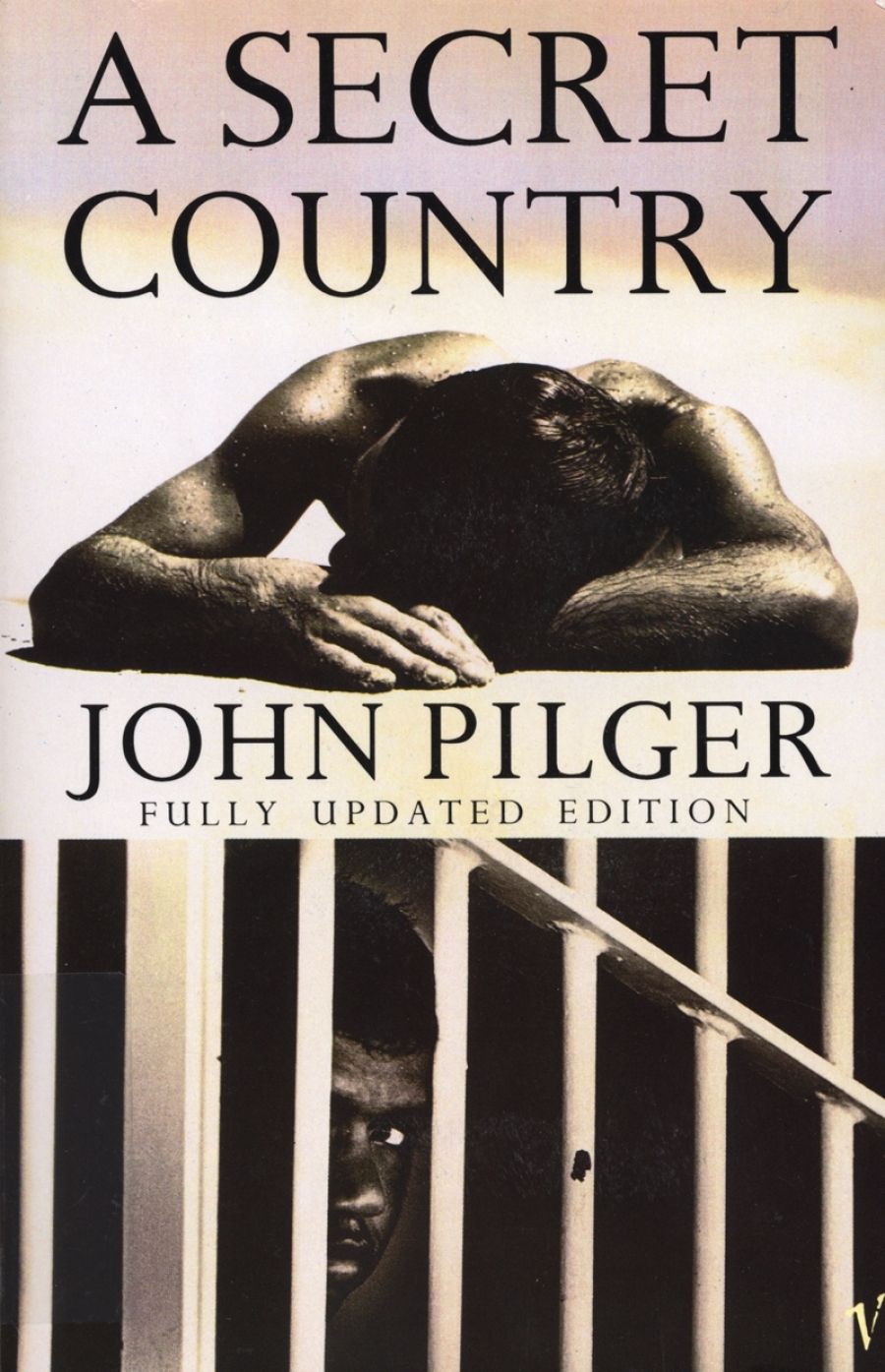
- Free Article: No
- Contents Category: Australian History
- Review Article: Yes
- Online Only: No
- Custom Highlight Text:
The morning ABC radio program AM is not a book program. But occasionally we’re pleased to take the opportunity to broadcast the story of a new book, particularly when it comments on Australian public affairs. When John Pilger’s A Secret Country was published, AM ran an interview with the author which was unusually long for us, some five or six minutes. The response was remarkable. In my two years as presenter of the program, I can’t recall as much listener interest in any item, judging by the number of telephone enquiries about the book we received in subsequent days.
- Book 1 Title: A Secret Country
- Book 1 Biblio: Jonathon Cape, 298 pp, $29.95 hb
- Book 1 Readings Link: booktopia.kh4ffx.net/J79Me
A Secret Country is a polemic written by a journalist from a school of writing for which there’s little place in today’s industry. The concept of balanced, disinterested journalism is a commercial invention. Late last century, the owner of The New York Times decided it would be in his commercial interest to develop the newspaper along non-partisan lines. He set out to win readers with diverse political views. Until then, newspapers served class and political interests. The concept of ‘balance’ spread and became central to the charter of government broadcasting organizations of the twentieth century like the ABC and BBC.
John Pilger doesn’t seek balance. He writes with passion and conviction. Don’t read A Secret Country in the hope of finding an even-handed account of historical and current events in Australia.
There’s a strong demonology in Pilger’s world. The worst offenders against his standards of civilization are: European, particularly Anglo, settlers of Australia for their crushing of Aboriginal culture and their systematic atrocities; most conservative politicians for their kow-towing to colonial masters in Britain and their readiness to play subordinates to the United States as well; and a new class of ‘mates’ who are turning Australia from a reasonably egalitarian society into their private fiefdoms of wealth.
Bob Hawke is a special target. He keeps bad company, says Pilger. He’s too close to Sir Peter Abeles, Rupert Murdoch, Alan Bond, and Kerry Packer. We’ve heard this before, of course, but there is some point to it.
Australia is a little society with awful potential for monopoly. Rupert Murdoch has sewn up the newspaper market (he publishes more than sixty per cent of Australia’s newspapers) and I haven’t heard anyone argue that’s in our best interests. The Murdoch monopoly was appeased by the Labor Party. Where was the Trade Practices Commission and the Foreign Investment Review Board?
Sir Peter Abeles has sewn up Australian transport. Already favoured by the scandalous two airline agreement, Sir Peter and his partner Rupert Murdoch walked right in to East West Airlines. Where was the Trade Practices Commission? In retailing, Coles walked right in to Myer, creating the most concentrated retail sector in the western world. Where was the Trade Practices Commission? These takeovers will have more long term damage-on Australia than most of us imagine. They will affect our economy long after the careers of Bob Hawke and his ministers have finished.
Pilger has selected some of the right targets but he’s botched the attack. The slings and arrows may hit the enemy but there isn’t much sting in the barbs.
There are many problems. There just isn’t much firepower of the intellectual sort. Pilger writes emotionally but not substantially. The foundations of the Australian establishment are vulnerable to incisive attack. There is a great story to be told about two centuries of white indifference, ignorance and murder of blacks. There are powerful lessons to be learned from Australian reliance on our British and American political and business patrons. There are tremendous dangers in the symbiotic relationships between strong politicians and big business. But no one could be persuaded on Pilger’s evidence alone. It’s too one sided, too narrow in its search for the whole story.
There’s also a problem of accuracy. Many of the matters raised in this book, matters with which I have personal acquaintance, are wrong in fact.
John Pilger criticises the Royal Commission into Aboriginal Deaths in Custody because it ‘studiously ignored the likelihood that a considerable number of Aborigines were murdered by police and prison officers’. In fact, the Royal Commission’s interim report in December 1988 said it would deal with this issue in its final report. The evidence, as I understand it, does not point in the direction Pilger suggests.
On the ANZUS alliance, Pilger states that New Zealand was expelled for its stand on nuclear ships. It has been heavied but it hasn’t been expelled.
On the ABC, Pilger states that John Beeston was executive producer of AM. That’s wrong: he was executive producer of The World Today during the time Pilger writes about. Not a big error, perhaps, but the following one is. Pilger states that David Hill was present at the twenty-first birthday party of Kerry Packer’s daughter, Gretel. Hill assures me he wasn’t. Besides, even if he were there’s an unpleasant insinuation of guilt by association. That style of journalism is best left in the McCarthyist era.
John Pilger’s book is a disappointment. I may have been impressed at a more impressionable age. But big issues need powerful journalism to be exposed. A Secret Country fails the test.


Comments powered by CComment